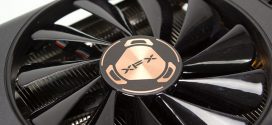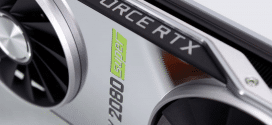Zotac GTX680 AMP Edition Graphics Card
Testing & Methodology

We’ve expanded our testing suite considerably since the X79 chipset release, and will continue to use the same methods for most of the motherboards and CPU’s we test. In the interests of thoroughness and accurate results, we run each test at least three times, and some tests more than that. We average the total of all the tests from each benchmark then report the average here.
The OS we use is Windows 7 Pro 64bit with all patches and updates applied. We also use the latest drivers available for the motherboard and any devices attached to the computer. We do not disable background tasks or tweak the OS or system in any way. We turn off drive indexing and daily defragging. We also turn off Prefetch and Superfetch. This is not an attempt to produce bigger benchmark numbers. Drive indexing and defragging can interfere with testing and produce confusing numbers. If a test were to be run while a drive was being indexed or defragged, and then the same test was later run when these processes were off, the two results would be contradictory and erroneous. As we cannot control when defragging and indexing occur precisely enough to guarantee that they won’t interfere with testing, we opt to disable the features entirely.
Prefetch tries to predict what users will load the next time they boot the machine by caching the relevant files and storing them for later use. We want to learn how the program runs without any of the files being cached, and we disable it so that each test run we do not have to clear Prefetch to get accurate numbers. Lastly we disable Superfetch. Superfetch loads often-used programs into the memory. It is one of the reasons that Windows occupies so much memory. Vista fills the memory in an attempt to predict what users will load. Having one test run with files cached, and another test run with the files un-cached would result in inaccurate numbers. Again, since we can’t control its timings so precisely, it we turn it off. Because these four features can potentially interfere with benchmarking, and and are out of our control, we disable them. We do not disable anything else.
We are revamping our testing method in order to better represent motherboard performance and offering to the consumer. Also we want to make it an easier read for you without miles of endless charts. We ask that you provide feedback in an effort to help us deliver better reviews for you.
Test Rig
| Test Rig | |
| Case | Open Air Test Bench |
| CPU | Intel Core i7-3770K |
| Motherboard | ASUS Maximus V Formula |
| Ram | 16GB Patriot Viper Xtreme 2400MHz + |
| CPU Cooler | Swiftech H20-320 Edge |
| Hard Drive | Western Digital Velociraptor 300GB |
| SSD | Intel 510 series SATA III 120GB |
| Optical | ASUS BD-ROM |
| GPU | ZOTAC GTX 680 AMP Edition |
| Additional Cards |
N/A |
| PSU | Thermaltake Toughpower Grand 1200W |
| Mouse | Tt eSPORTS Black gaming mouse |
| Keyboard | Tt eSPORTS Meka G1 mechanical gaming keyboard |
In order to ensure no system bottleneck we clocked the CPU to 4.6GHz to ensure there is no reason the system will slow down the cards performance at all.
Some may ask why we chose the mainstream Z77 system and we can explain. Up until recent the X79 enthusiasts platform does not really support PCIe Gen 3 on the Nvidia 600 series GPU’s and come to find out it is due to the inherent instability many have seen with the X79 platform with Gen 3 products including AMD parts. This is why Nvidia has been hesitant to enable it, and now there is a workaround via registry to get it working but in order to ensure best possible testing scenarios we have stuck to the natively supported Z77 platform.
Important note: Overclocking can cause component failure. Please exercise caution when attempting any level of overclock on system components.
Test Suite
We will use the following applications to test the performance of the graphics card.
Synthetic Benchmarks & Games
| Benchmarks |
|---|
| 3DMark11 |
| Aliens vs. Predator |
| Batman: Arkham City |
| Dirt 3 |
| Metro 2033 |
Overclocking

The ZOTAC AMP Edition card overclocked well but a bit below others i have tested. The maximum clock setting I could reach with the AMP edition is 1143MHz with full stability. The voltage increase was limited with the software I used for testing but with some software with a bit more headroom or even maybe a hard mod for vGPU I think this card could have more in it. One good thing is that even with maximum clock the card did not reach a temp that I would consider in an unsafe zone as it barely touched 75°C.
Memory overclocking was not bad at all as I hit 1880MHz with full stability which is nothing to scoff at. All in all the card comes with a decent overclock out of the box and has some headroom to spare. It may not be as much as some but it does do well.
| Clock | Max stable |
| GPU Core | 1143MHz |
| Memory | 1880MHz |
Temperatures

The temperatures were recorded with full loaded Heaven benchmark looping for over 30 minutes or longer depending how long it took for the card to level out in temps and sat at a plateau for more than 10 minutes.
| GPU Temperatures | Temperature (Idle/Load) |
| ZOTAC GTX 680 AMP OC | 33C/75°C |
| ZOTAC GTX 680 AMP | 31C/74°C |
The AMP Edition cooler kept things in check rather well and for this I really have no complaint but its thermals are not exceptionally better than others we have tested so for that I would say it is passable.
The Zotac GTX 680 AMP Edition cooler is well tuned as even under load with the fans starting to ramp heavily the sound I hear from it is not strong enough that I would worry about hearing it in a closed case. On a test bench it is noticable at 4 feet but at 2 feet you definitely know its there.
Real world/Gaming Benchmarks
3DMARK 11

3DMark 11 is the newest in Futuremark’s suite of benchmarking utilities. Its a fully capable DirectX11 benchmark which also stresses and analyzes the system performance as a whole to simulate a heavy rendering environment such as a high end game or other app the end user may run. This benchmark was run with Performance settings 5 times and all runs were averaged for the result below.
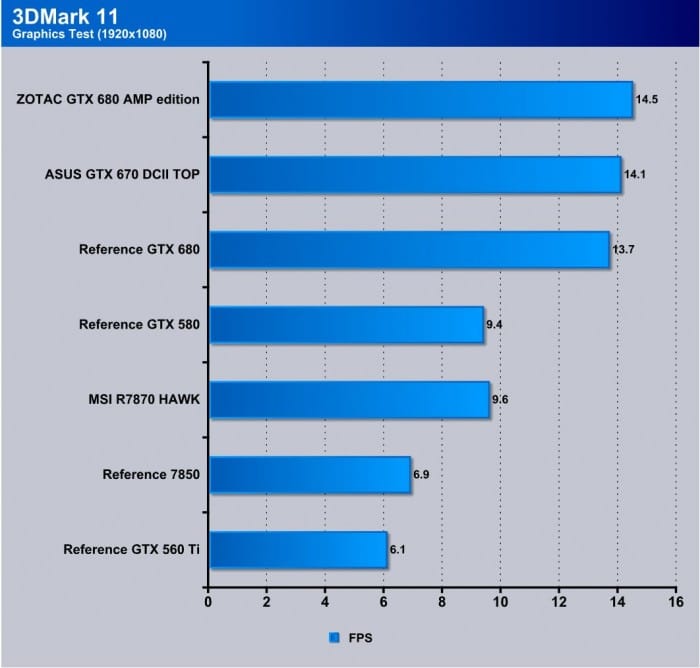
Here the AMP edition holds a decent lead over a reference 680 which is nice and definitely any advantage over the reference card is a plus.
Aliens Vs Predator
Aliens Vs Predator is a quite demanding game and overall just a cool title so we had some fun running this one through its paces.
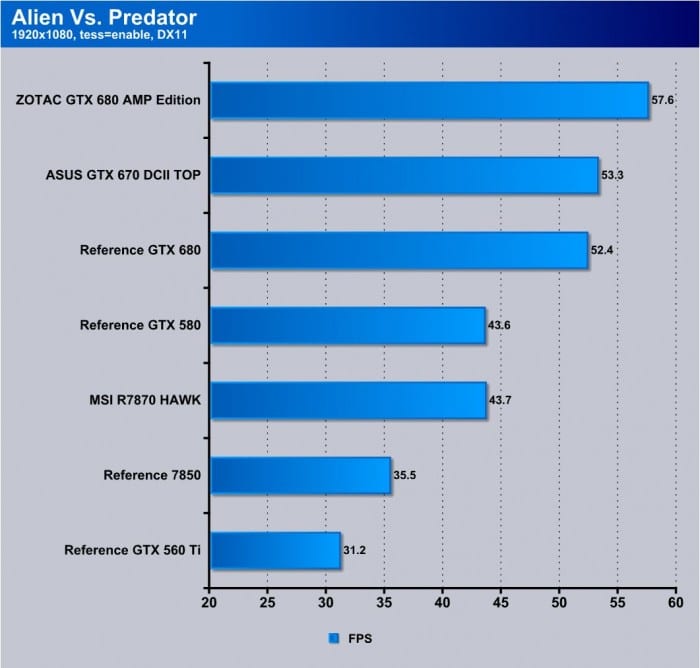
Alien Vs. Predator makes for a strong showing for the AMP card as it jumps far ahead of the reference 680 and 670 which is definitely a excellent result.
Metro 2033

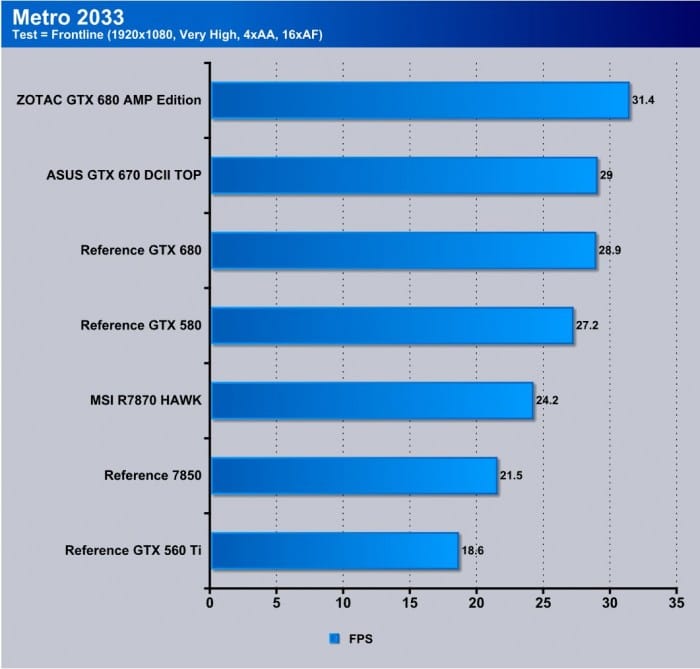
Metro 2033 likely one of the toughest games to crack that I have tested with as it brings virtually every GPU to its knees. The Zotac AMP 680 holds its own but still with full detail i would say we need at least 2 cards to guarantee smooth gameplay as this game is just flat out stressful.
Batman: Arkham City
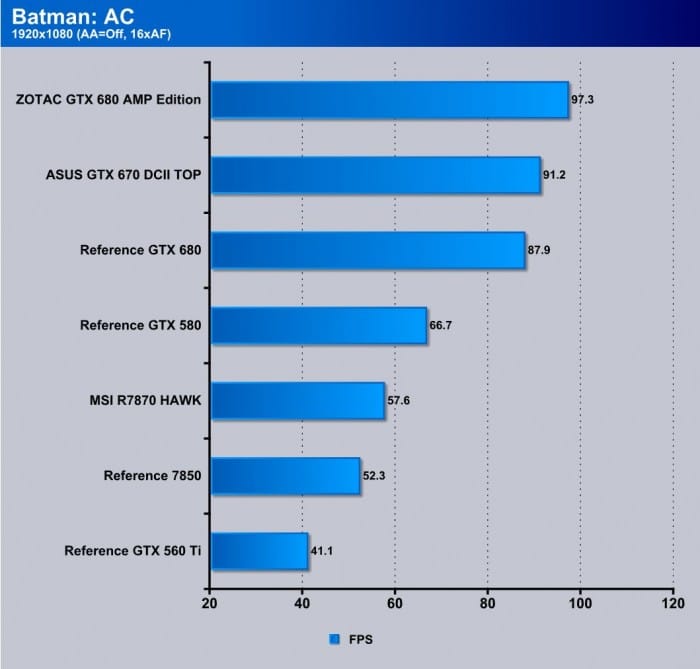
Batman once again shows the AMP’s strengths as it gains 10 FPS over the reference 680 which is very good especially as this card is basically just a high binned reference model card.
Dirt 3
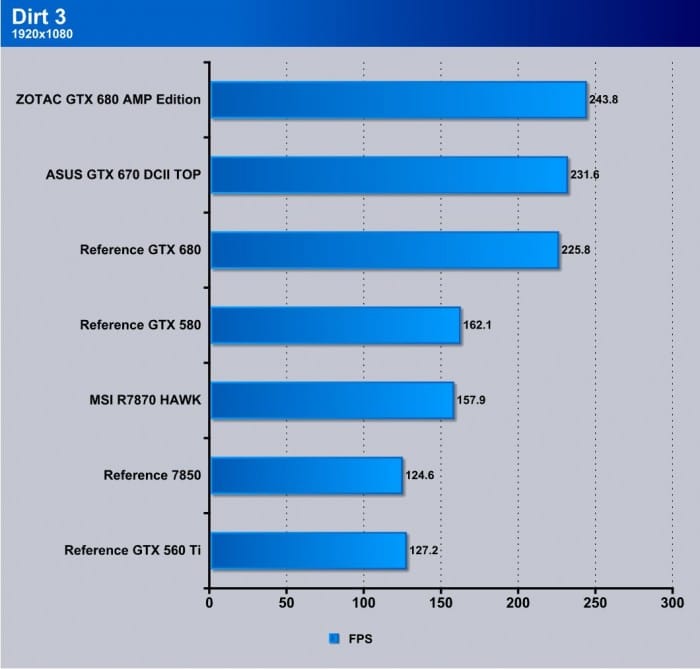
Dirt 3 although being marketed with AMD cards shows a strong result with the 680 although the AMP does not take as commanding of a lead it still does take a nice lead above the 670 and reference 680.
 Bjorn3D.com Bjorn3d.com – Satisfying Your Daily Tech Cravings Since 1996
Bjorn3D.com Bjorn3d.com – Satisfying Your Daily Tech Cravings Since 1996

